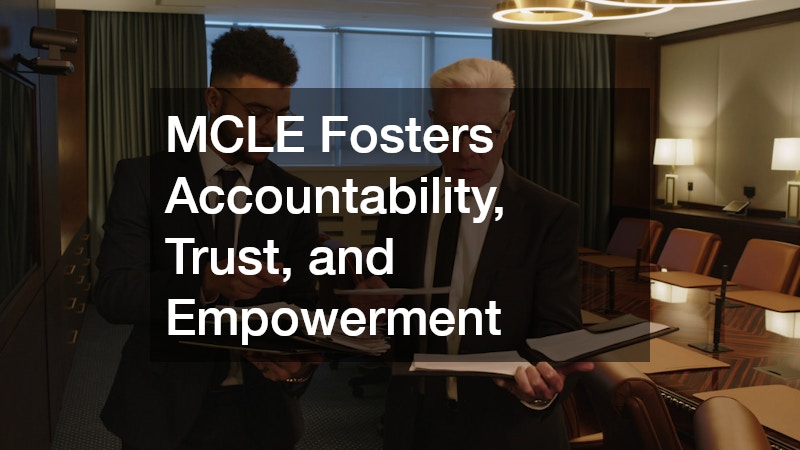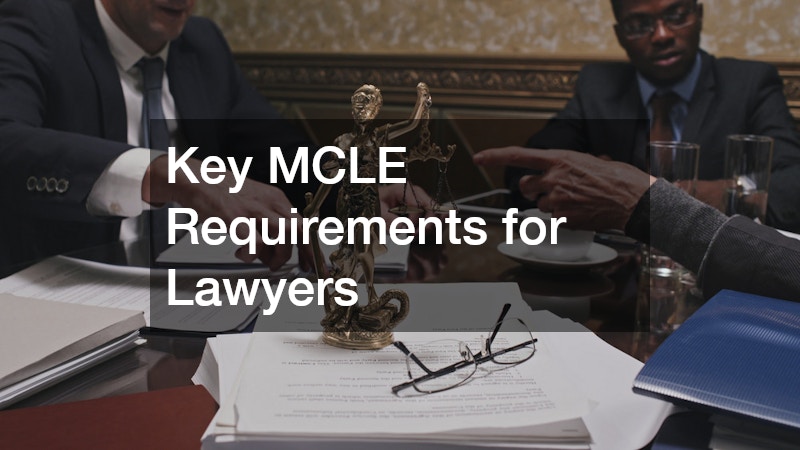
Mandatory Continuing Legal Education ( MCLE) is an essential aspect of the legal profession, ensuring that lawyers maintain their competencies and adjust to the evolving landscape of the law. These educational requirements are designed to promote ongoing professional development, allowing practitioners to stay abreast of legal changes and best practices. By committing to lifelong learning, attorneys not only enhance their skill set but also uphold their duty to provide competent representation to clients.
What are MCLE Credits and How Do They Work?
Definition and Importance of MCLE Credits
MCLE credits are units of measure used to quantify the amount of continuing education a lawyer must complete to remain in good standing with their respective bar organization. These credits serve as a benchmark for ensuring that legal professionals continue to hone their skills and expand their knowledge base throughout their careers. Without these requirements, lawyers may miss out on critical updates and innovations in the legal field, which could compromise their ability to effectively advocate for clients.
The Process of Earning MCLE Credits
Lawyers can earn MCLE credits through various educational activities, such as attending approved legal seminars, workshops, and conferences that specialize in different areas of law. Many jurisdictions also accept credits from online courses and webinars, which offer the flexibility to accommodate the demanding schedules of practicing lawyers. Tracking these credits typically involves keeping detailed records of completed courses and submitting them to the appropriate regulatory body for verification.
Impact of MCLE Compliance on Legal Practice
Meeting MCLE requirements is integral to maintaining the integrity and efficiency of one’s legal practice. Compliance demonstrates a lawyer’s commitment to professional growth and ensures that they remain knowledgeable about recent legal developments, ultimately benefiting their clients. Failure to comply with these requirements may jeopardize a lawyer’s reputation and could lead to disciplinary measures, affecting their ability to practice law competently.
How Often Must Lawyers Fulfill MCLE Requirements?
Frequency of MCLE Obligations
Typically, lawyers are required to fulfill their MCLE obligations every one to three years, depending on the regulations set forth by their jurisdiction. This periodic education ensures that lawyers stay current with the ever-changing legal environment and emerging areas of law. The specific number of credits required within each reporting cycle varies, but it generally provides a reasonable expectation for continuous legal education.
Variation Across Jurisdictions
The MCLE requirements for lawyers can differ significantly between jurisdictions, reflecting the unique priorities and regulatory frameworks in place. Some regions may mandate specific course types, such as ethics or new technology law, to address local practice concerns or developments. Lawyers need to familiarize themselves with the rules applicable to their jurisdiction to ensure complete compliance and avoid any inadvertent infractions.
Tracking and Managing MCLE Compliance
Effective management of MCLE compliance involves meticulous record-keeping and timely submission of credits to maintain active legal standing. Many jurisdictions provide online systems where lawyers can track their completed credits and manage necessary submissions, streamlining the administrative process. Proactively managing these records assists in preventing any discrepancies that might arise during the compliance verification process, ensuring a lawyer remains in good standing.
What Are the Consequences for Failing to Meet MCLE Requirements?
Potential Disciplinary Actions
Failing to meet MCLE requirements can result in various disciplinary actions ranging from monetary fines to suspension of the ability to practice law. Such penalties underscore the profession’s emphasis on continuous education and the importance of adhering to mandated standards. These repercussions not only affect the individual lawyer but can also tarnish the reputation of their associated firms or practice areas.
Impact on Legal Licensure
Non-compliance with MCLE obligations can have a significant impact on a lawyer’s licensure, potentially leading to suspension or revocation of their legal practice credentials. This severe consequence reflects the critical role that continuing education plays in ensuring professional competence and ethical practice. Lawyers who fail to meet these requirements may face additional scrutiny and heightened regulatory oversight, complicating their professional obligations.
Ways to Rectify Non-Compliance
For lawyers who find themselves non-compliant with MCLE requirements, several remedies are typically available to correct their standing. Many jurisdictions offer remedial measures such as grace periods, extended deadlines, or specific courses designed to meet outstanding credit requirements. By taking swift action to address non-compliance, lawyers can mitigate potential disciplinary actions and demonstrate their commitment to maintaining the integrity of their practice.
Mandatory Continuing Legal Education (MCLE) requirements are crucial to ensuring that lawyers remain proficient and informed about the ever-evolving legal landscape. By embracing continuing education, legal professionals not only bolster their own expertise but also uphold their commitment to delivering competent and ethical services. Proactive compliance with MCLE standards is essential for maintaining the credibility and efficacy of the legal profession, benefiting clients and society at large. Ultimately, MCLE fosters a culture of accountability, reinforces public trust in the legal system, and empowers attorneys to navigate complex legal issues with confidence and integrity.

